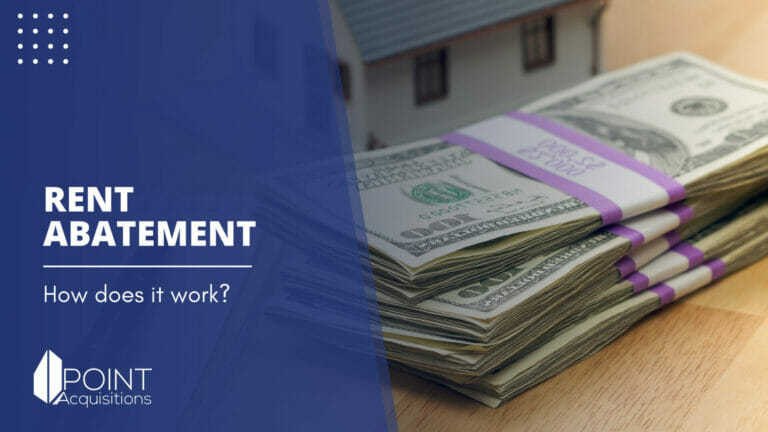
What is Rent Abatement in Commercial Real Estate?
Commercial rent abatement is an agreement between a tenant and landlord in which the tenant pays reduced rent, or no rent at all, for a specified time. A RA can be a great way for tenants to start a new space without worrying about making rent payments.
This blog post will discuss rent abatement and how it can benefit both landlords and tenants in the commercial real estate market.

Table of Contents
What is a rent abatement?
Rent abatement is a rent reduction, or “rent holiday,” typically agreed upon between a tenant and landlord at the beginning of a lease.
The rent abatement period can last for any time, but commercial real estate owners typically suspend rent payments for the first few months of the lease term. The tenant receives free rent for an agreed-upon time frame during the rent abatement period.
For example, if a tenant has a rent abatement agreement for the first six months of their lease, they would only be responsible for paying rent for the remaining six months of a one-year lease term.
What is a partial rent abatement?
Partial rent abatement is when the landlord agrees to provide a rent reduction rather than the entire amount.
For example, if a tenant has a partial rent abatement agreement for the first six months of their lease, they would be responsible for paying 50%, for example, of their rent during that period.
What is retroactive rent abatement?
If a landlord fails to maintain a habitable property and the tenant is forced to conduct business in the commercial property, they might be eligible for retroactive rent abatement.
In this case, the rent reduction would be applied to the time period the landlord failed to maintain the property up to habitability standards.
Importance of Rent Abatement in Commercial Real Estate for CRE Owners & investors
Abatement of rent is essential in commercial real estate for a few reasons:
Negotiation Tools
Rent abatement can be used as a negotiating tool between landlords and tenants. If a tenant wants to lease space in a new building, they may ask for a rent reduction to make the deal more affordable and attractive.
Get more long-term tenants.
Rent abatement can be used to incentivize tenants to sign a lease. Landlords may offer rent reduction as an incentive for tenants to sign a long-term lease.
Fill vacant spots
Third, rent abatement can help landlords fill vacant space. If a landlord has vacant space in their building, they may offer rent abatement to attract new tenants.
Importance of Rent Abatement in Commercial Real Estate for Tenants
Rent abatement can be a great way for tenants to save money, especially when first moving into a new space.
In addition, rent abatement can be used as a negotiating tool to get a lower rent price from the landlord.
If you are a tenant looking for a rent reduction, ask the landlord if they are willing to provide rent abatement before signing the lease!
Understanding Rent Abatement
Now that we have discussed what rent abatement is and how it can be used in the commercial real estate market let’s look at how it works.
Rent abatement typically starts on the date that the lease is signed. The rent abatement period can last for any time; however, the rebate typically lasts for the first few months of the lease term.
The tenant is may still responsible for paying rent during a partial rent abatement period, but the amount is reduced. If it is a complete rent abatement, the tenant gets to start a business with free rent. For example, if a tenant has a rent abatement agreement for the first six months of their lease, they would only be responsible for paying rent for the remaining six months of a one-year lease term.
At the end of the rent abatement period, the tenant will need to start paying rent at the total amount specified in the lease agreement.

Pros of Rent Abatement
There are a few critical benefits of rent abatement that landlords and tenants should be aware of:
Landlord Perspective
- Rent abatement can be used as a negotiating tool to get tenants to sign a lease.
- Rent abatement can help landlords fill vacant space in their buildings.
Tennant Perspective
- Rent abatement can be a great way for tenants to save money, especially when first moving into a new space.
- Rent abatement can be used as a negotiating tool to get a lower rent price from the landlord.
Cons of Rent Abatement
There are a few drawbacks of rent abatement that landlords and tenants should be aware of:
Landlord Perspective
- Rent abatement can reduce the rent that a landlord receives from their tenants.
Cons on the Tennant Perspective
- A rent abatement may end up costing more over a lease period.
- You may be required to pay for all repairs and maintenance during the rent abatement period.
Tips on how to negotiate rent abatement for a rental property
Don’t be afraid to negotiate and request rent abatement! Landlords may be willing to provide rent abatement, but you must ask for it.
Be sure to do your research before beginning negotiations. Know what rent abatement is and how it can be used in the commercial real estate market.
When you are ready to start lease negotiations, be sure to have a clear idea of what you want from the rent abatement agreement.
Be prepared to compromise during the negotiation process. Remember that the goal is to come to an agreement beneficial for both parties involved.
If you cannot reach an agreement with the landlord, be willing to walk away from the deal. There are other rental properties on the market, and you don’t want to sign a lease for a property that isn’t a good fit for your needs.
Rent Abatement FAQs
Here are a few frequently asked questions for rent abatement:
How long is the typical lease length that includes a RA?
Rent abatement can be offered for any length of lease term but is typically only offered for multi-year leases.
Are there any drawbacks of rent abatement?
There are a few drawbacks of rent abatement that landlords and tenants should be aware of:
- As mentioned above, a rent abatement can reduce the rent that a landlord receives from their tenants.
- A rent abatement may cost more over a lease period if the tenant is responsible for any repairs or maintenance during the rent abatement period.
What are some things to keep in mind when considering rent abatement?
Some things to keep in mind when considering rent abatement include:
- Be sure to ask the landlord if they are willing to provide rent abatement before signing the lease.
- Be aware of any repairs or maintenance that may need to be done to the property before signing a commercial real estate lease.
- Understand how long the rent abatement period will last and what the rent price will be after the rent abatement period ends.
- You still need to pay for business liability insurance, business interruption insurance, and other similar expenses during the rent abatement period.
When is a rent abatement not a good idea?
There are a few instances where rent abatement may not be a good idea:
If you are looking for a long-term commercial lease, rent abatement may not be the best option as it typically only lasts for the first few months of the lease and can sometimes cost the same or more than a standard lease.
If you are looking for a commercial property in move-in condition, a RA may not be the best option.
Conclusion
We can define rent abatement as an agreement between a tenant and landlord in which the tenant pays reduced rent or no rent for a specified time. Be sure to keep the pros and cons of rent abatement in mind when negotiating your lease agreement! For a tenant, rent abatement can be a great way to save money, especially if they are moving into a new space for the first time. A RA can be a tool to negotiate longer leases with tenants for landlords.
Read about other agreement options in our blogs: Triple Net Lease and Ground Lease to see if they are a better option for you.
If you are looking and can’t find a property that doesn’t fit your business needs check out our blog Build to Suit to find a space that is tailored for you
About The Author

Jesse Shemesh
Disclaimer
Please note that Point Acquisitions is not a tax expert or tax advisor. The information on our blogs and pages is for general informational purposes only and should not be relied upon as legal, tax, or accounting advice. Any information provided does not constitute professional advice or create an attorney-client or any other professional relationship. We recommend that you consult with your tax advisor or seek professional advice before making any decisions based on the information provided on our blogs and pages. Point Acquisitions is not responsible for any actions taken based on the information provided on our blogs and pages.
1031 Exchange Capital Gains Tax Deferral
According to a 2021 report by the National Real Estate Exchange Services (RES), over 240,000 1031 exchange transactions were completed in the United States, totaling $100 billion. This impressive figure underscores the role of 1031 exchanges in the real estate…
Read More1031 Exchange Benefits
As of Q4 2023, the national vacancy rate for all commercial property types in the United States sat at 9.2%, according to CBRE’s latest insights and research. This represents a slight decrease compared to the previous quarter and suggests a…
Read More1031 Exchange Legal Considerations: A Must-Read Guide
You’re in the right place if you’re considering a 1031 exchange for your commercial real estate investments. Whether you’re a seasoned investor or just dipping your toes into the market, understanding the legal landscape of 1031 exchanges is key to…
Read More

